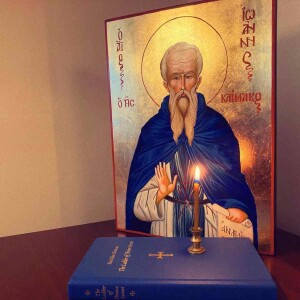Monday Nov 04, 2024
The Evergetinos: Book Two - Hypothesis XXIII, Part II and XXIV, Part I

Tonight we read the final sections on the fathers’ reflection on the practice of fasting. Once again the focus is on decorum; how does one eat in the presence of others while not giving himself over to pride. It is ever so easy to think oneself the great ascetic and hold oneself above others within the community. Ego can even distort well-practiced discipline into something that sets oneself apart from others rather than leads one to show greater desire for God, virtue and mercy towards others.
All of our practices, the fathers teach us, must be guided by spirit of gratitude. We give thanks for the food that we receive and that nourishes us and we avoid criticizing others for how much they eat. Self discipline is not a weapon to be wielded by the ego for its own pleasure. Our tendency is to devour our brothers’ flesh by our criticism, and as the psalmist tells us to “eat up God’s people as if eating our bread.”
A humble attitude must be fostered, and we must not be ill-mannered. For example, a senior monk within a monastery must not demand honor or reverence or put on airs before his juniors. He must not draw attention to Himself in any way that would diminish charity among the brothers. What is the value of toiling all day only to undermine oneself to satisfy petty pride?
Again, the fathers want us to understand that fasting and all of our disciplines are about love. We must not diminish the practice by becoming legalistic or moralistic in our view. Therefore, we are taught not to takes oaths about avoiding certain foods. In doing so we set aside the freedom that is ours. No food is reprehensible. We are merely to eat with restraint and gratitude. But if we take an oath and then break it by eating the particular food we fall into perjury. As Christ tells us, no food is unclean; rather it is what comes out of the heart that makes a person unclean or sinful.
A rather lengthy discussion ensued in regards to avoiding a kind of ghetto mentality in our Christian practice; setting ourselves apart from others rather than serving them in the love of Christ. It is a narrow line that we walk and demands that we understand that all is grace. Christ has taken on our poverty and emptied himself in order that we might know the fullness of life and love. Our exercise of the faith, that is, our asceticism, must be relational; it must be directed toward Christ and enable us to love as He loves. Asceticism is not an end in itself, nor do we live out our Christianity in isolation. We turn to Christ, we die to sin and self, in order to be raised to life in him. To avoid the kind of isolationism that we would see in the scribes and Pharisees, we must become Christ.
---
Text of chat during the group:
00:09:37 Cindy Moran: The joys of home ownership 😜
No comments yet. Be the first to say something!